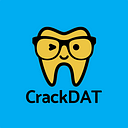Deciding on a DAT date: Five tips for determining when to take the DAT
This pre-dental blog is brought to you by Crack the DAT. Crack the DAT offers all the resources you need to ace your Dental Admission Test, all in one place! Try it today: CrackDAT.com
How do you determine the right time to take the Dental Admission Test (DAT)? While there’s no single correct answer (everyone’s journey to dental school is unique), below are five questions to ask yourself as you decide which DAT date works best for you.
1. When do you want to apply to dental school?
This is possibly the most important consideration before deciding on a test date. Keep in mind that the application to dental school, ADEA AADSAS, typically begins to allow application submission in early June each year. For the 2020–21 application cycle, which began somewhat later than usual, the first possible submission date was June 16, 2020.
Generally, the earlier you are able to submit your dental school application, the better, since applications are typically reviewed in the order they are submitted and admissions are rolling. Therefore, aim to have taken your DAT by May or June of the year you plan to apply to dental school. Work backwards to decide on a date! For example:
When you hope to BEGIN dental school: Summer or Fall 2022
When you will apply: Summer 2021 (a year before you hope to matriculate)
Therefore, take the DAT by: May or June 2021 (to be ready to submit your application ASAP)
It is possible to submit your application before having taken the DAT, as long as you plan to take the DAT later in the application cycle before the deadline. However, your application usually won’t be considered “complete” and reviewed fully until your scores have been verified, which happens a couple of weeks after taking your DAT.
2. Have you completed enough science coursework?
The DAT is a science-heavy test, so aim to take the DAT after you have completed your prerequisite coursework in Biology, General Chemistry, and Organic Chemistry. Other science courses, including Biochemistry, Genetics, and Anatomy & Physiology, will also help prepare you for the test, but having a solid, general foundation in biology and chemistry is most important. You might consider taking the DAT within a year of completing this coursework so the content is fresher in your mind (say, the summer after your sophomore or junior year of college, depending on when you complete these prerequisites).
If it has been a long while since you last took a science course, don’t feel discouraged: there are countless resources available to help you re-learn the content you will need to be successful on test day. And all test-takers, regardless of when they last took a science course, will need to review material and get comfortable with the specific content and format of the DAT.
3. What’s your study style?
Some people prefer having many months to study, studying for fewer hours each day over a longer period of time. Others prefer a more compact study schedule, studying over a shorter period of weeks (if you work best under pressure, this may be your study style). Reflect on your study style based on your past experiences, and be realistic with how much you can get done each day. Allot yourself a bit of extra time if possible because studying often takes longer than expected. Crack the DAT has 4-week, 8-week, and 12-week study schedules, so whether you’re studying over a shorter or longer period of time, you can feel prepared.
4. What are your score goals?
The DAT is a great opportunity to boost your dental school application. If your GPA is lower than average, you might be aiming for an above-average DAT score. If your grade in Organic Chemistry wasn’t what you hoped it would be, you might show your mastery of the subject with a fantastic Organic Chemistry DAT score. Set a goal for yourself based on the other aspects of your application and the programs you might apply to, and reflect on how much effort will be required to make that goal a reality. If you’re aiming for a stellar score, you will likely need to set aside more study time. Consider taking a DAT diagnostic test to gauge how much time you might need to invest to reach your goals.
5. What are your other obligations?
The DAT is undoubtedly an important step in your pre-dental journey, but it won’t be your only obligation. You might be enrolled in school, working part- or full-time, or have commitments to your family, and you’ll surely be balancing other activities and roles. Reflect on these obligations, and think about how much time you’ll have available to study for the DAT without sacrificing your health, happiness, and well-being. If you have any upcoming breaks or freer periods, you might consider scheduling your test then. For current college students, winter and summer breaks are great opportunities to study for the DAT without the added pressure of coursework and extracurricular activities. If you’re not currently a student, determine if there are any particularly busy months in the foreseeable future, and aim to avoid scheduling your DAT then, if possible (it would be challenging to study for the DAT the month of a big project or presentation!)
Ready to schedule your DAT? You can read more about signing up for the DAT step-by-step here. Regardless of when you take the test, have confidence that you have the resources, ability, and support to crush the DAT.
—
Join the Crack the DAT community, connect with other pre-dental students, and ask questions! Join the Facebook group here.
Crack your Dental Admission Test! Visit our website at CrackDAT.com.
